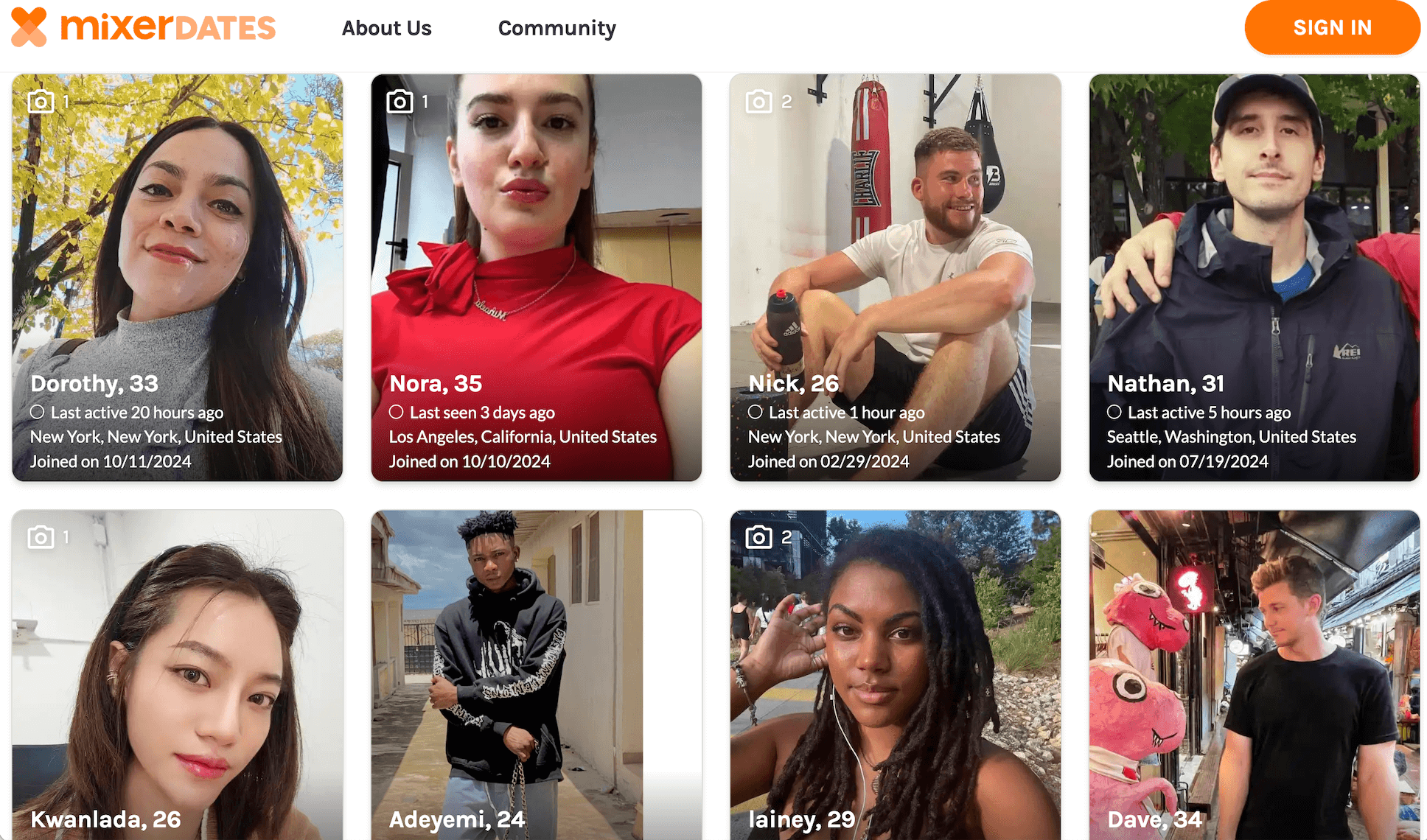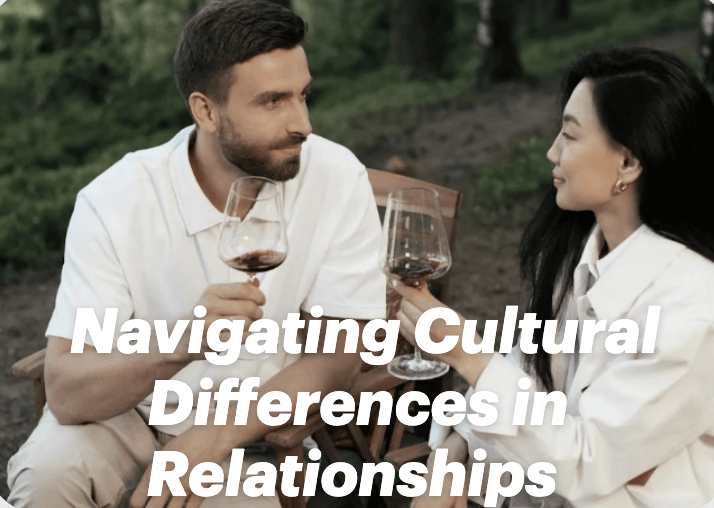Have you ever found yourself in a relationship where you and your partner came from completely different cultural backgrounds? Maybe you’ve experienced that moment when a simple gesture or phrase doesn’t quite translate the way you thought it would. It can be confusing at first, but here’s the thing: these cultural differences are what make relationships so exciting and, when approached with respect, can deepen the connection you share.
Cultural differences in relationships aren't something to shy away from—they're opportunities to learn, grow, and expand your understanding of the world. Whether you're dating someone from a different country, background, or even just a different family culture, these differences can enrich your experience in ways you never imagined.
At MixerDates, we celebrate cultural diversity in dating. We believe that relationships formed across cultural lines bring the best of both worlds together, and we’re here to help you navigate those differences with ease and confidence.
Table of Contents
1. Understanding Cultural Differences: What They Really Mean in Relationships
2. Common Challenges in Cross-Cultural Relationships
3. How to Handle Cultural Differences in a Healthy Way
4. Embracing Cultural Differences: The Benefits of Being in a Cross-Cultural Relationship
5. Finding Someone Who Understands Your Values
6. Conclusion: Love Knows No Boundaries
1.Understanding Cultural Differences: What They Really Mean in Relationships
So, what exactly do we mean when we talk about “cultural differences” in relationships? Simply put, it’s the variations in customs, values, beliefs, and behaviors that arise from the diverse backgrounds individuals come from.
These differences can be anything from how you celebrate holidays to how you communicate with one another. For example, in some cultures, family is the heart of everything, and spending holidays with extended relatives is expected. In others, personal space and independence are highly valued, and holidays are more intimate affairs. These differing values might lead to some initial misunderstandings, but with mutual respect and open communication, they can become opportunities to learn.
Real-life example: Imagine you’re dating someone who comes from a culture where public displays of affection are not common, while you might have grown up in a culture where holding hands or a kiss on the cheek is a regular thing. At first, you might feel like they’re distant, but in reality, they might just be respecting their own cultural boundaries. Understanding these differences is key!
In a multicultural relationship, the goal isn’t to change each other but to understand and appreciate the differences that make you both unique. And this is where MixerDates shines—a platform designed to bring together people from all walks of life, allowing you to meet individuals who appreciate your culture as much as you embrace theirs.

2. Common Challenges in Cross-Cultural Relationships
Every relationship comes with its challenges, but when cultures collide, some challenges can feel a little more... complex. Here are some of the common hurdles couples in cross-cultural relationships face:
• Communication Styles
Cultures can greatly influence how people communicate, and it’s not always as straightforward as you might think. Some cultures value directness, while others prioritize subtlety and non-verbal cues. For example, if you’re from a culture where being upfront is common, you might feel frustrated if your partner tends to communicate indirectly.
Example: "In many Asian cultures, politeness is key, so your partner may avoid saying ‘no’ directly, even if that’s their answer. It’s not personal—it’s just their way of showing respect."
• Family Expectations
Family plays a major role in many cultures, and your partner might have different expectations when it comes to family involvement. You may be used to spending holidays alone or with just a few close family members, while your partner’s culture expects large family gatherings and constant interaction. Learning to navigate these different expectations can be tricky, but it’s important to create space for both partners.
Example: "In many Latin cultures, family is everything. So your partner might expect Sunday dinners with the whole extended family, which could feel overwhelming if you’re more independent with your family."
• Stereotypes and Assumptions
It’s easy to fall into the trap of assuming that your partner’s cultural background defines them entirely. But just like everyone else, your partner is an individual, and it’s crucial to get to know them beyond stereotypes.
Example: "If your partner comes from a traditionally conservative background, you might assume they have conservative views. But don’t make assumptions—people can surprise you."
• Different Views on Money and Finances
Cultural values often shape how people approach money, saving, and spending. In some cultures, financial stability is highly prized, while in others, spending on experiences or family is prioritized. These differing views can lead to friction if not openly discussed.
Example: "In some cultures, saving for the future is a top priority, while in others, spending on travel or social gatherings might be seen as more important. Discussing money habits openly can prevent misunderstandings."
• Views on Independence and Interdependence
In many cross-cultural relationships, one partner may value independence more than the other, which can create tension. Some cultures emphasize individualism, where partners are expected to pursue their own goals, while others view relationships as more interdependent.
Example: "In many Western cultures, personal freedom and independence are highly valued, whereas in some Eastern cultures, the success of a couple is often seen as a joint effort."
• Handling Conflict Differently
Conflict resolution can vary significantly across cultures. Some people might prefer to confront problems head-on, while others may avoid direct confrontation or prefer to process issues privately. These differences can sometimes make conflict feel more complicated than it needs to be.
Example: "In some cultures, people tend to avoid arguments and let things cool down, while others may engage in open debates to resolve issues. It’s important to respect each other's ways of dealing with conflict."
• Religious Differences
Religion often plays a significant role in people's lives, and differing religious practices and beliefs can create friction in relationships. It’s essential to have open conversations about religious customs, holidays, and how they might affect your time together.
Example: "If one partner practices a specific religion and the other doesn’t, questions about how holidays are celebrated or how religious values are integrated into everyday life can arise. Understanding each other’s beliefs can help navigate these differences."
• Racial and Ethnic Identity
Cultural and racial backgrounds can influence how you and your partner view the world, and these differences may sometimes lead to misunderstandings. Being open and sensitive to each other's racial and ethnic identity is key to fostering respect and understanding.
Example: "You may find that your partner faces challenges related to their racial or ethnic identity that you might not fully understand. Taking the time to learn about each other's experiences can strengthen the bond."
• Expectations of Gender Roles
Gender roles and expectations can differ widely depending on cultural backgrounds. What’s considered acceptable behavior for men and women in one culture might not be the same in another, which could cause friction if these roles are assumed or misunderstood.
Example: "In some cultures, traditional gender roles are more pronounced, while in others, gender equality may be emphasized. It’s important to discuss and respect each other’s perspectives on roles within the relationship."
• Parenting Styles and Children’s Roles
How children are raised and their role within the family structure can vary widely across cultures. Differences in how to discipline children, expectations around their behavior, and family obligations can be a point of tension if not discussed openly.
Example: "In some cultures, children are expected to take care of their elders, while in others, there’s a greater focus on children’s independence. Discussing your parenting philosophies early on can prevent future conflicts."

3. How to Handle Cultural Differences in a Healthy Way
Managing cultural differences in a relationship takes patience, empathy, and a willingness to learn. Here are some practical tips for navigating the complexities of cross-cultural dating:
• Patience and Open Communication
The key to overcoming cultural differences is to be patient and to communicate openly. If something feels strange or uncomfortable, ask your partner about it rather than assuming. And be ready to share your own feelings and experiences too.
Tip: “If you don’t understand a certain tradition or behavior, ask your partner about it. Don’t be afraid to have a conversation—this is how you build understanding.”
• Respect for Traditions and Beliefs
Even if you don’t completely understand or agree with your partner’s cultural practices, respecting them is essential. You don’t have to change your own traditions, but finding common ground can make both partners feel valued.
Tip: “Perhaps you don’t celebrate the same holidays, but you can still show interest in your partner’s traditions. Attending a celebration that’s important to them shows respect and support.”
• Compromise and Adaptability
Like any relationship, compromise is important in cross-cultural dating. You might have to adapt to new customs or find new ways of celebrating special occasions, but it’s all about building a life that blends both cultures harmoniously.
Tip: “In some cases, it’s about finding new ways to celebrate both your backgrounds. Maybe you mix your family’s traditions with your partner’s to create new, shared rituals.”
• Be Open to Challenging Your Own Views
Being in a cross-cultural relationship often forces you to reflect on your own beliefs and values. While this can be uncomfortable at times, it’s also a valuable opportunity for growth. Embrace the chance to challenge your own assumptions and expand your worldview.
Tip: “Don’t shy away from uncomfortable conversations. They can help you see the world through your partner’s eyes, broadening your perspective and helping you grow.”
• Create a Safe Space for Differences
Acknowledge that cultural differences might cause friction, but it’s important to create an environment where both partners feel safe to express themselves without fear of judgment. When differences arise, it’s vital to handle them with care and empathy, recognizing that it’s not about right or wrong, but understanding and respecting each other’s background.
Tip: “When conflicts arise, approach them with curiosity rather than defensiveness. This will help you handle disagreements with respect and avoid unnecessary tension.”

4.Embracing Cultural Differences: The Benefits of Being in a Cross-Cultural Relationship
While there are definitely challenges that come with being in a cross-cultural relationship, the rewards far outweigh them. Embracing cultural differences can deepen your connection and open up a whole new world of experiences.
Dating someone from a different cultural background introduces you to new foods, traditions, and languages. It’s like taking a journey without having to leave home. Whether it’s discovering a new favorite dish or picking up a few phrases in another language, these little experiences can add a rich layer to your relationship. Imagine trying a traditional dish from your partner's culture that you’ve never heard of before or hearing a language spoken in your own home. It’s a way to expand your world and make it more colorful, without needing to board a plane. For instance, if your partner’s family celebrates a holiday with customs that are unfamiliar to you, participating in that celebration can open your eyes to new perspectives on community and togetherness.
Another significant benefit is that navigating cultural differences can lead to stronger communication and a deeper connection. In a cross-cultural relationship, you can’t just rely on assumptions about how the other person thinks or behaves. Instead, you need to communicate openly, ask questions, and learn about each other’s cultural norms and values. This process helps build a deeper understanding, and it’s through this constant learning that your bond grows stronger. Over time, you’ll develop a deeper respect for each other’s differences and become more attuned to each other’s needs. The more you understand your partner’s background, the more you’ll be able to relate to their emotions, decisions, and reactions. Even when disagreements arise, understanding where your partner is coming from makes it easier to find common ground and resolve conflicts.

5. Finding Someone Who Understands Your Values
Navigating cultural differences in relationships can bring unexpected challenges. Take, for instance, my own experience. After living in New York for five years, I recently moved back to my hometown in Arkansas and started dating a local girl. Things seemed to be going fine until she found my old MixerDates conversations on my browser history. At first, it was just a joke—“Oh, so you’re into these kinds of girls?”—but quickly it escalated into something much more intense.
She started judging me for the women I had chatted with online, particularly the Latina and Asian women. She even went as far as mentally tallying their ethnicities, which, to her, seemed like a problem. I didn’t consider myself having a “thing” for any one ethnicity; it was more about the fact that New York’s dating scene opened me up to meeting a broader variety of women compared to the more homogenous options back home. But, as the conversation spiraled, her remarks became more pointed, and she accused me of being racist, and worse—she started throwing things and going on a tirade about all the Black guys she'd dated, calling me “pathetic” and a “commie.” It was like she was trying to cut me down at every opportunity.
Now, I’m left reflecting on whether this was about her insecurities, her fears of me dating outside the local norm, or something deeper. Was she intimidated by the fact that I dated women from other cultural backgrounds? Or was this all a reaction to something else, like election stress or media influences? It’s tough to know. But one thing is for sure: relationships should be built on mutual respect, understanding, and shared values. And if we can’t meet on those fundamental things, maybe it's time to reconsider the relationship.
This experience made me realize just how important it is to find someone who truly understands and respects your values, especially when it comes to cultural diversity. At MixerDates, you can meet people who not only appreciate diversity but also embrace it. Whether you're someone who's always been open to dating across cultural lines or someone who's just beginning to explore those possibilities, MixerDates connects individuals from a wide range of backgrounds who understand the importance of respect, communication, and shared growth. If you're looking for someone who values your culture—and respects theirs as well—MixerDates is the perfect platform to help you find that connection.

6. Conclusion: Love Knows No Boundaries
Cultural differences in relationships don’t have to be barriers; they can be bridges that connect you to a deeper, more meaningful love. When approached with respect, patience, and open communication, these differences can enrich your relationship and allow both partners to grow.
So, if you're looking for someone who celebrates diversity and wants to navigate cultural differences with understanding and excitement, MixerDates is here to help. Sign up today and start exploring a world of new possibilities in love.



